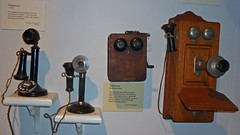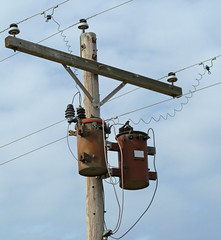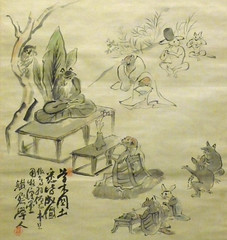 As an historian, I consider anniversaries irrelevant. However, as a social function, naturally, they matter a great deal, and the internet itself moves so quickly at times that it’s worth looking back regularly to maintain perspective. Twitter itself, for example, is less than five years old, and I’ve been using it for about two years. About
As an historian, I consider anniversaries irrelevant. However, as a social function, naturally, they matter a great deal, and the internet itself moves so quickly at times that it’s worth looking back regularly to maintain perspective. Twitter itself, for example, is less than five years old, and I’ve been using it for about two years. About a year two years1 ago, our erstwhile colleague Katrina Gulliver began cataloging historians on twitter under the title Twitterstorians, and now has a list of a few hundred participants, ranging from personal accounts to institutional ones to historical recreation and quotation lists.
Like any social media, a lot of what happens on twitter appears to be fluff and nonsense, even a lot of what comes from the accounts of bona fide historians. I consider twitter to be a kind of semi-professional discussion: not a private, personal space,2 nor a professional project,3 but a space for informal discussions on political, cultural, historical and educational matters (with the ocassional foray into fluff and nonsense, for fun). I do have some local colleagues on twitter, and there are a few other Japanese historians4 as well as a pretty good collection of non-historian Japan-interested folks.
 The population of historians, and Japan people, on twitter has a very strong overlap with the blogging world, naturally. Six years ago I wrote a meditation on academic blogging in which I argued that the blog was capable of enhancing or extending most of the core functions of the academy, especially the social ones — teaching, seminars, colloquia, conferences, faculty lounge, writing groups5 — and that remains true. Twitter is less useful for some of these function, because of the 140 character limit, but even that doesn’t preclude serious and extended discussions: it just breaks it up.6 You can also use Storify to collect a discussion into a more coherent form. And twitter is, arguably, more conducive to the chatting-around-the-coffee-pot (or -over-beer) aspects of academic life, as well as being an excellent medium for quick updates and the “comment-and-link” which was the origin of “web-log.” Twitter doesn’t replace blogging as a medium or long form writing platform, but it has effectively displaced some of the shorter, lighter material that might otherwise have appeared on the blog. The immediacy of twitter is also a powerful tool in rapdily emerging situations, though the signal-noise problem is always real.
The population of historians, and Japan people, on twitter has a very strong overlap with the blogging world, naturally. Six years ago I wrote a meditation on academic blogging in which I argued that the blog was capable of enhancing or extending most of the core functions of the academy, especially the social ones — teaching, seminars, colloquia, conferences, faculty lounge, writing groups5 — and that remains true. Twitter is less useful for some of these function, because of the 140 character limit, but even that doesn’t preclude serious and extended discussions: it just breaks it up.6 You can also use Storify to collect a discussion into a more coherent form. And twitter is, arguably, more conducive to the chatting-around-the-coffee-pot (or -over-beer) aspects of academic life, as well as being an excellent medium for quick updates and the “comment-and-link” which was the origin of “web-log.” Twitter doesn’t replace blogging as a medium or long form writing platform, but it has effectively displaced some of the shorter, lighter material that might otherwise have appeared on the blog. The immediacy of twitter is also a powerful tool in rapdily emerging situations, though the signal-noise problem is always real.
 I’ve made connections that I might not have otherwise, and strengthened others. I’ve live-tweeted political events and pre-semester movie screenings, I’ve watched other people live-blog conferences7 and joined in conversations about the scholarship. I’ve traded syllabus tips and book recommendations. Nothing earthshatteringly new, mind you. But a lively medium, with a good mix of professional and unprofessional conversations, that helps me stay connected, up-to-date, part of the ongoing discussions.8 It combines the open platform of blogs, the deliberate creation of connections between people which makes facebook interesting, and the ability to have quiet discussions without the whole world following. On the whole, I’ve enjoyed twitter quite a bit.
I’ve made connections that I might not have otherwise, and strengthened others. I’ve live-tweeted political events and pre-semester movie screenings, I’ve watched other people live-blog conferences7 and joined in conversations about the scholarship. I’ve traded syllabus tips and book recommendations. Nothing earthshatteringly new, mind you. But a lively medium, with a good mix of professional and unprofessional conversations, that helps me stay connected, up-to-date, part of the ongoing discussions.8 It combines the open platform of blogs, the deliberate creation of connections between people which makes facebook interesting, and the ability to have quiet discussions without the whole world following. On the whole, I’ve enjoyed twitter quite a bit.
I’ll link here to other Twitterstorian 2nd Anniversary Blog posts as they become available: Check it out!
What a shameful mistake for an historian! ↩
I use facebook for that, where I limit my contacts to family, close friends and long-time acquaintances. No, I don’t assume it’s secret (which is what most people mean by ‘private’ but that it’s out of easy reach, and personal rather than professional) ↩
Like this blog, or my course blogs ↩
not a complete list. Morgan Pitelka has an account, though he doesn’t say much. I’m sure there are more, too. There always are. ↩
I didn’t include that last time, but I’ve seen some great examples both on and off twitter ↩
and since there’s overlap between the twitter and blogging world, it’s not at all uncommon for a discussion to move back and forth from twitter to a blog, and back again. ↩
I’ve tweeted from conferences, but mostly didn’t want to take focus away from my note-taking, which was conspicuous enough ↩
Like all social media, it can be a little addictive/overwhelming at times. I deliberately follow a relatively small number of feeds – and check a larger number irregularly through the ‘lists’ feature – to keep the flow of information manageable. Selection is key: ‘curation’ is the buzzword now, and it’s not a bad description, as I’m deliberately trying to maintain both personal connections, and add a small number of high-quality feeds (i.e., people who serve as information gatekeepers!) in areas that I want to know more about. It’s a learning process ↩